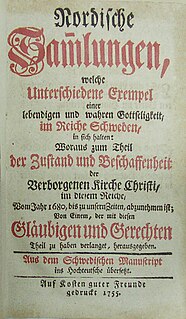Related Research Articles

Open communion is the practice of some Protestant Churches of allowing members and non-members to receive the Eucharist. Many but not all churches that practice open communion require that the person receiving communion be a baptized Christian, and other requirements may apply as well. In Methodism, open communion is referred to as the open table.

The Moravian Church, or the Moravian Brethren, formally the Unitas Fratrum, is one of the oldest Protestant denominations in Christianity, dating back to the Bohemian Reformation of the 15th century and the Unity of the Brethren founded in the Kingdom of Bohemia, sixty years before Luther's Reformation.
EMB may refer to:

The Radical Reformation represented a response to corruption both in the Catholic Church and in the expanding Magisterial Protestant movement led by Martin Luther and many others. Beginning in Germany and Switzerland in the 16th century, the Radical Reformation gave birth to many radical Protestant groups throughout Europe. The term covers radical reformers like Thomas Müntzer and Andreas Karlstadt, the Zwickau prophets, and Anabaptist groups like the Hutterites and the Mennonites.

The Prussian Union of Churches was a major Protestant church body which emerged in 1817 from a series of decrees by Frederick William III of Prussia that united both Lutheran and Reformed denominations in Prussia. Although not the first of its kind, the Prussian Union was the first to occur in a major German state.

High church Lutheranism is a movement that began in 20th-century Europe and emphasizes worship practices and doctrines that are similar to those found within both Roman Catholicism and Eastern Orthodoxy and the Anglo-Catholic wing of Anglicanism. In the more general usage of the term, it describes the general high church characteristics of Lutheranism in the Nordic countries such as Sweden, Finland, Estonia and Latvia. The mentioned countries, once a part of the Swedish Empire, have more markedly preserved Catholic traditions.

The Czechoslovak Hussite Church is a Christian church that separated from the Catholic Church after World War I in former Czechoslovakia.
The Liturgical Movement was a 19th-century and 20th-century movement of scholarship for the reform of worship. It began in the Catholic Church and spread to many other Christian churches including the Anglican Communion, Lutheran and some other Protestant churches.

The Polish Reformed Church, officially called the Evangelical Reformed Church in the Republic of Poland is a historic Calvinistic Protestant church in Poland established in the 16th century, still in existence today.

The Evangelical Lutheran Church in Bavaria is a Lutheran member church of the Evangelical Church in Germany in the German state of Bavaria.
The Hochkirchliche Vereinigung Augsburgischen Bekenntnisses is a Lutheran High Church organisation in Germany. It was founded in Berlin in October 1918, inspired by the High Church theses Stimuli et Clavi (1917) by Heinrich Hansen. Later it was greatly influenced by the Evangelical Catholic theology of professor Friedrich Heiler.

Radical Pietism are those Christian churches who decided to break with denominational Lutheranism in order to emphasize certain teachings regarding holy living. Radical Pietists contrast with Church Pietists, who chose to remain within their Lutheran denominational settings. Radical Pietists distinguish between true and false Christianity and hold that the latter is represented by established churches. They separated from established churches to form their own Christian denominations.
Berneuchen Movement is part of the Lutheran Liturgical movement in Germany. It originates from German Youth Movement.
Wilhelm Stählin was a German Lutheran theologian, bishop, preacher and one of the major initiators of the Liturgical Movement in German Protestantism in the 20th Century.
Helmut Friedbert Richard Siegfried Echternach was a German Lutheran theologian and pastor, and one of the leaders of the Lutheran High Church Movement in Germany.
Evangelisch-Lutherische Gebetsbruderschaft is a German Lutheran religious society for men and women, based on the doctrines of the Bible and Book of Concord, with regular prayer for the renewal and unity of the Church.

Protestantism is a form of Christianity that follows the tenets of the Protestant Reformation: a major movement within Western Christianity that began in the 16th century against what its followers perceived to be errors, abuses, innovations, discrepancies, and theological novums within the medieval Catholic Church.

The Bohemian Reformation, preceding the Reformation of the 16th century, was a Christian movement in the late medieval and early modern Kingdom and Crown of Bohemia striving for a reform of the Roman Catholic Church. Lasting for more than 200 years, it had a significant impact on the historical development of Central Europe and is considered one of the most important religious, social, intellectual and political movements of the early modern period. The Bohemian Reformation produced the first national church separate from Roman authority in the history of Western Christianity, the first apocalyptic religious movement of the early modern period, and the first pacifist Protestant church.

A breviary is a liturgical book used in Christianity for praying the canonical hours, usually recited at seven fixed prayer times.
References
- Swidler, Leonard J.: The Ecumenical Vanguard: The History of the Una Sancta Movement
- Universitätskirche Marburg - Die evangelische Michaelsbruderschaft Archived 2016-06-02 at the Wayback Machine
- 50 Jahre Michaelsbruderschaft by Jürgen Boeckh. Quatember 1981 (p. 239-240)
- Giewald, A. & Thomann, G. "The Lutheran High Church Movement in Germany and its liturgical work: an introduction", Lulu.com, 2011. ISBN 978-1-4709-7378-0